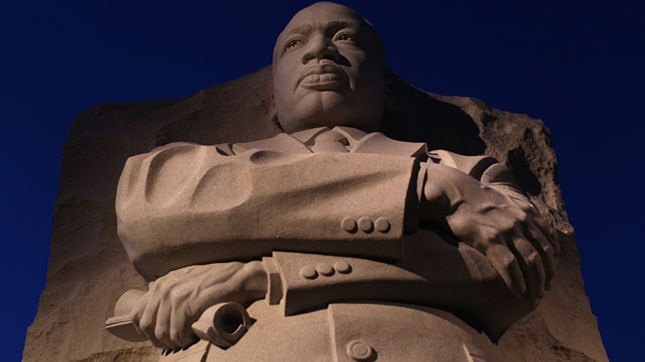Skill Builders
Article
Reflections on Martin Luther King Jr.

Martin Luther King, Jr. was an American secular hero as well as a world religious public figure. When he stepped into the public scene as a civil rights activist, he was responding to a social injustice challenge, an injustice he had lived with all of his life. Now the wilderness was crying for a voice and King responded to that intense cry.
When you listen to the "Preacher King's" speeches or sermons, the elements of rhetoric are distinguishable: ethos, pathos, and logos. His ethos was hard-won by his own risk of life itself. The pathos of his memorable cadences reflected the cry of 400 years of injustice articulated in the voice of one chosen man. The logos was always there, the cry of all the biblical prophets concentrated into one voice.
How has he influenced my preaching ministry? First, Dr. King employed his obvious use of repetition in his sermons. The art of repetition was inferred by a rich tradition in African-American preaching. Repeating the same phrase with crescendo (the inflection and intonation of his voice) and cadence (the deliberate pitch, pause, and pace of his words).
Secondly, the freight upon which he used to carry that cargo was the quality of concrete specific imagery, the ability to use the power of description in his sermons. The devices he used to persuade his hearers included both alliteration and euphony.
Another way King impacted my pastoral preaching is by the way he moved from the individual to the social. Dr. Gardner C. Taylor commented, "Preaching that doesn't begin with the individual never begins, but preaching that stops with only the individual never finishes." Dr. King did not privatize Christianity. He certainly called people to personal faith in Christ, but he also saw the work of Christ as more than personal salvation. He proclaimed that the work of Christ in the life of the individual is to change society, institutionally, politically, and socially. He believed Christianity was not limited to the domain of the local church. The influence of Christianity was to be seen and felt in the public square. His cry for social justice opened the evangelical world to reflect on all public issues of impact. Before Dr. King we just focused on saving souls; after King we also focusing on saving the world we live in.
He has also taught me to preach with hope in God's power. Dr. King possessed a great sense of optimism in his preaching. He was not an Amos crying out that it was too late. Neither was he a Jeremiah only lamenting; he was more like an Isaiah with a great vision of the future. He had a positive vision. He sounded more like the peaceable kingdom of Isaiah, than the imprecations of the psalmist. He did not say it was too late; he expected sunrise, whether he lived to see it or not. He expected the best of his adversaries: one day they would see that he was right and they would do right. He really believed in the best of humanity.
Finally, he has also helped me as a preacher because of his willingness to live in the middle of pressure from both sides. On the one hand, the bigots hated his very existence and turned loose the dogs of Birmingham. On the other hand, the Nation of Islam and the Black Panthers thought he was too passive. Added to that, Dr. J.H. Jackson of the African-American National Baptist Convention stridently opposed his own brother Martin. Jackson was a Booker T. Washington gradualist and opposed even passive resistance. Dr. King had to live and minister amidst those who opposed him on every side, even others of his race.
Yet amidst all of this, he stood his ground. In his final opposition to the Vietnam War and his call for economic justice, he lost support from some of his own followers. Yet with integrity and consistency he lived and died as his own man, responding to God's call on his life. As a pastor with the daily pressures of those inside and outside the church, I too identify with his need and commitment to live in the middle between many constituents on every side who see things in their own ways.
The greatest impact of King is simply that he was. Now a national holiday and a statue on the national Mall remind us that such a man existed. No African-American leader can wake up any morning of his or her life and not live with the reality that this man did live, did act, did change, did call for the best, and did die doing it. His influence is always with us. His shadow falls across every day and his dream reappears in the night hours. For those of us who follow after him we live with the weight of the future that he predicted in the past. We cannot escape it and must live it out into the horizon and to the top of the mountain where he peered into the future that last night in Memphis. That last night calls us into an eternal day.
Ralph Douglas West serves as founder and senior pastor of The Church Without Walls (Brookhollow Baptist Church, Houston, Texas).











